The following are notes I made from listening to an audio interview with Miss Annie Rogers of Home Farm, High Street. The interview was recorded on 18th July 1994 by Essex Record Office. The village archive at the pavilion holds a copy of the interview on CD and it is well worth listening to Miss Rogers describing her happy childhood and the village just after the First World War. She would have been 91 at the time of the interview.
Miss Rogers was born in Chrishall in April 1903, daughter to Albert and Alice Rogers. There were 11 children in the family eventually although Annie’s eldest brother Leonard was killed in the First World War aged just 19. (The excellent “Chrishall at War” publication can be read here, linked from the Chrishall Parish Council website). Miss Rogers spent all her childhood in the village until the age of 15 when she went as an apprentice to a drapers at Linton.
School
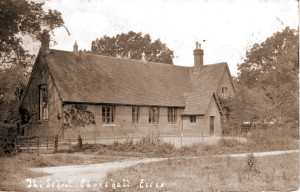 Annie enjoyed attending the village school where they had lessons in scripture, geography and singing. They sung a lot at school she remembers! There were games but Annie can only remember playing cricket. There was also needlework and she remembers being complemented on her beautiful stitching. At just over 14 she left school but Miss Harmer wanted to know if she would like to be a teacher. She declined but accepted homework which Miss Harmer would send home and then Annie would send back to be marked. She continued to do this until she left the village at age 15.
Annie enjoyed attending the village school where they had lessons in scripture, geography and singing. They sung a lot at school she remembers! There were games but Annie can only remember playing cricket. There was also needlework and she remembers being complemented on her beautiful stitching. At just over 14 she left school but Miss Harmer wanted to know if she would like to be a teacher. She declined but accepted homework which Miss Harmer would send home and then Annie would send back to be marked. She continued to do this until she left the village at age 15.
There were no school uniforms then but they wore white pinafores over dresses, long stockings and boots. “Nothing showy”. Annie’s mother, Alice, was very good at needlework and made some dresses but most she would buy from Streets of Saffron Walden.
Shopping
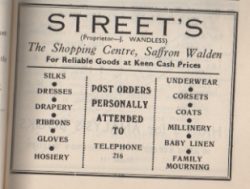 They would be taken in to Saffron Walden to be “rigged out” with clothes and hats from Streets (in the High Street next to Palmers) for the girls and outfits for the boys from Palmers. When Mother wanted to go shopping Father would drive them in to Saffron Walden in the pony and trap. Later on there were Weedons buses which went to Walden each week.
They would be taken in to Saffron Walden to be “rigged out” with clothes and hats from Streets (in the High Street next to Palmers) for the girls and outfits for the boys from Palmers. When Mother wanted to go shopping Father would drive them in to Saffron Walden in the pony and trap. Later on there were Weedons buses which went to Walden each week.
Other shopping apart from clothes was all done in the village. There were Chambers at Martinholme who sold groceries and would also order you dresses from London. And Jacksons from Fowlmere were one of the many traders who came to the village. Miss Rogers felt the village was very well provided for “if you had the money to pay for it” – a very telling phrase. There was also Mrs Andrews who had a shop down Church Road where the boys would go for sweets. Then “later on” there was Mr Hicks the butcher also in Church Road.
Miss Rogers much admired her mother who she said was very clever in managing the home.
Attending Chapel
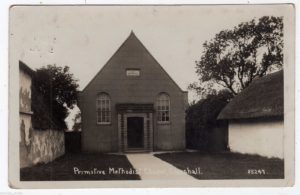 Sundays was a day for attending chapel – three times a day for the children. Mother would stay at home in the morning to cook dinner and would then come to services in the afternoon and back for the evening. Sunday as a ‘no work’ day was held to very strictly at Home Farm with Father prohibiting even the pulling of a cabbage from the garden. Those who walked up from Builden End to attend services would bring their dinner with them and stay for the day.
Sundays was a day for attending chapel – three times a day for the children. Mother would stay at home in the morning to cook dinner and would then come to services in the afternoon and back for the evening. Sunday as a ‘no work’ day was held to very strictly at Home Farm with Father prohibiting even the pulling of a cabbage from the garden. Those who walked up from Builden End to attend services would bring their dinner with them and stay for the day.
There were no cars but Father had a pony and trap and would go to Hempstead to take services in the chapel there. Miss Rogers says she was taught to drive the pony but wasn’t too keen to drive.
Childhood
Annie remembers a lot of fun being part of a big family. They had a playhouse at the back of the house where they would spend a lot of time. However as a little girl she became very ill and the family feared she would die. She had double pneumonia and was away from school for many weeks, nursed at home with only oxygen to help. Annie also recalls having a bad cough at school which would disturb the class.
After she was ill Father bought her a nice doll and they would make clothes for their dolls. Christmas day they always had toys and Christmas dinner was usually a chicken and later on perhaps a turkey when they were kept on the farm. The home cooked food was so good and included jugged hare, bacon and onion roll and meat pies and puddings. Annie also remembers the rice puddings.
Albert was a carpenter by trade but took to farming and gradually changed to become a farmer renting some land to add to Home Farm. He grew corn and had pigs, cows and sheep later on. The four girls would help at harvest setting the sheaves up and pulling ‘carlock’ a yellow flowering weed that grew in the corn.
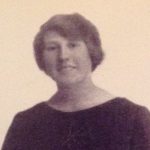
Miss Annie Rogers
Music and entertainment
There were no holidays or family outings that were taken all together. However Annie remembers Chrishall Fair which was held once a year on 1st May. It was often a cold day and comments would be made that ‘it would be better weather after Chrishall Fair’. She remembers it once being held on Thorns, the field at the back of Home Farm, but mostly it was held ‘up the village’ (presumably on Jigneys playing field by the new school). They had roundabouts and stalls and someone making rock.
The family were very musical. Father Albert used to get up at 5am in his younger days to go and have music lessons and all the children were given the opportunity to learn a musical instrument. Annie and her sister Bessy played the organ as did brother Leslie who played the chapel organ for many years.
Fetching water
There was no water at the house and all water for cooking had to be fetched from the village pump. If the children complained Father would tell them “you can bring half a pail, there’s no need to bring a full one!”
For washing they saved the rainwater and all washing of clothes and people was carried out in the wash-house at the back of the main house. They would all have a bath once a week. There was an outside toilet too as for all the houses in the village at that time. Father died in 1945 so was never to see the coming of the sewers or electricity.
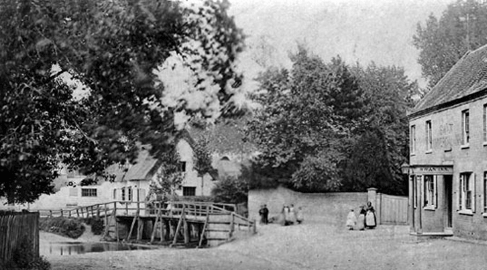
Linton
Working away
At 15 Annie went to work for a Drapers in Linton (believed to be Holtums). She was there for four years – the first three being her apprenticeship. She did not come home for the first month so she was settled in but she felt very homesick.
She earned half a crown a week and lived in the business house with three other women. The men had separate accommodation and worked on the grocery side of the business. She learned to deal with calico, mainsook and all the haberdashery.
Annie would have quite liked a little business of her own in Chrishall but felt she could not set up with the likes of Chambers and Mrs Andrews already there.
Do call at the village archive in the pavilion when it opens in 2017 and ask to hear the CD of this interview. Then you too can enjoy Annie’s gentle voice and the ticking of the clock as she tells her stories. And if you have any memories of Streets store, Holtums at Linton or anything else mentioned in this article do let us know by getting in touch or leaving a comment below.
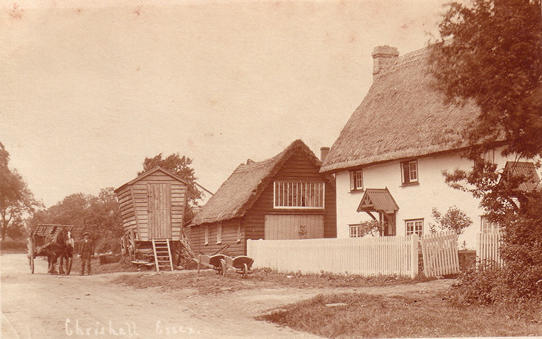
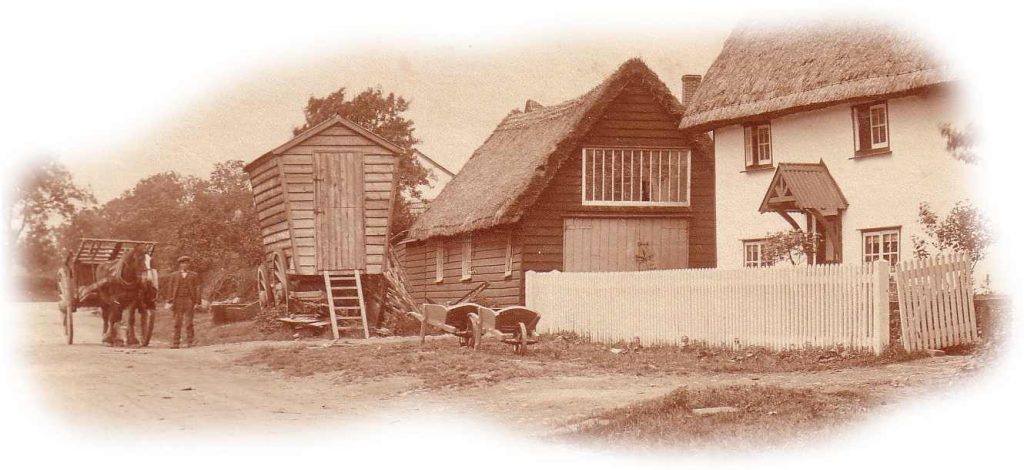
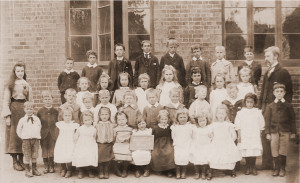

Annie is my great aunt – I have many fond memories of her – she was a very sweet lady and kept us amused as children with her stories – its so special to read her memories. Thank you
That’s lovely Diane – thank you for getting in touch.
Hello Diane, Auntie Annie was also my great aunt – I am the youngest daughter of Sheila Norman and her mother was Mabel Rogers. My sister Sarah and I have lots of happy memories of Auntie Annie and Home Farm and all her brothers and sisters popping in!